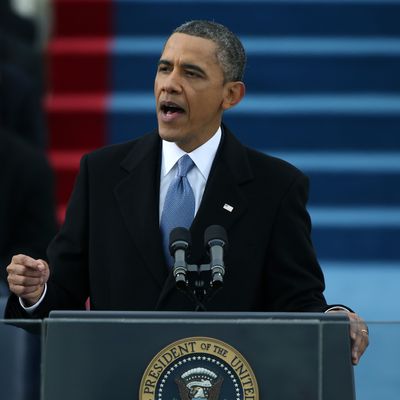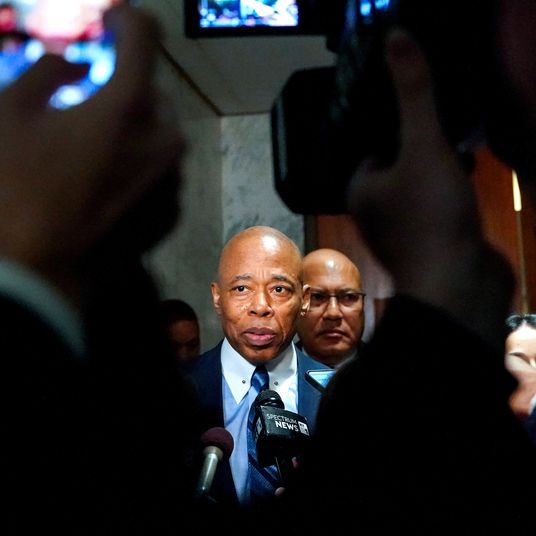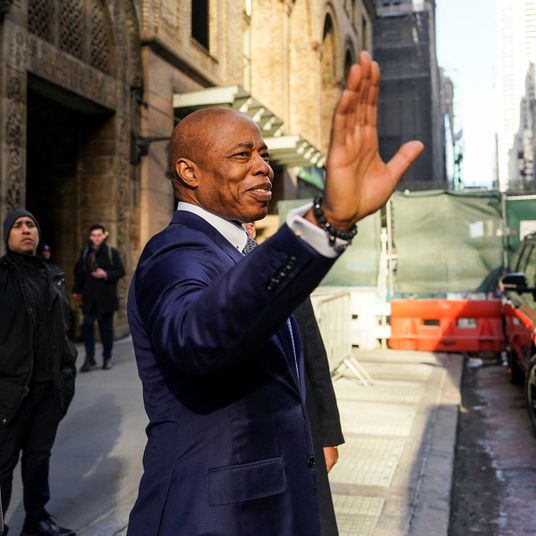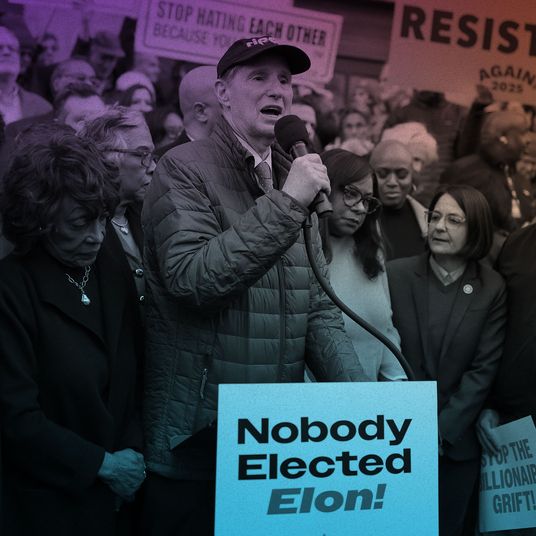
Ramesh Ponnuru argues today that President Obama’s second term already looks like a major disappointment, if not an outright failure. It is nice that Ponnuru has given events enough time before casting judgment (a full three months of the term are already gone, with a scant 45 remaining). And yet some elements of his indictment nonetheless feel wanting.
Obama, argues Ponnuru, “could end up signing fewer pieces of major legislation in the first year of his second term than did George W. Bush.” “Fewer” is a very strange metric to gauge legislation, especially if you’re a conservative. I asked Ponnuru which major 2005 legislation he had in mind, and he cited the bankruptcy law, a free-trade agreement with the Dominican Republic and Central America, a law blocking municipal gun lawsuits, an energy bill, and a transportation bill.
It is true that, judged in purely quantitative terms, 2005 was a banner legislative year for the Bush administration and its Congressional Republican allies. A law making it harder to declare bankruptcy was a staggering triumph for the banking lobby, though also a staggering failure that contributed to the crash two years later. The law prohibiting lawsuits against gun manufacturers was a huge triumph for the National Rifle Association. The energy bill sprayed federal largesse at the energy industry in a way that drew scorn from right and left alike. The transportation bill was basically a status quo reauthorization of transportation, plus a healthy dose of pork, which included the “Bridge to Nowhere.” The combination of all these things eventually came to be seen by conservatives as the GOP’s final descent into lobbyist-driven corruption and the deserving cause of the 2006 backlash that brought Democrats back into power. It is, to say the least, an unusual model for Ponurru to hold up.
Nobody really challenges the premise that George W. Bush and a Republican Congress could find more grounds for legislative agreement than could President Obama and a Republican Congress. Going into Bush’s second term, the expectation was that Bush would continue the legislative juggernaut of his first term, which produced a couple of huge tax cuts, a Medicare bill, a couple of wars, and a Department of Homeland Security. Obama is coming off of a two-year stalemate with the GOP Congress.
Ponnuru, though, builds his argument on the premise that Obama should be passing a huge flurry of laws. He won a big reelection, his coalition is growing, so: “One might therefore expect Obama to be enacting the legislative agenda of that rising coalition.”
Wait. Who exactly might be expecting John Boehner to be passing a flurry a liberal bills through the Republican House and past a Senate Republican filibuster?
Ponnuru doesn’t quote anybody who expected this. The “one” who “might” expect this apparently either has never seen the Schoolhouse Rock episode about how a bill becomes a law, or else expected that Eric Cantor, Mitch McConnell, & Co. would suddenly experience a shocking and completely secret ideological conversion, or else was expecting Obama to dissolve the Congress and begin ruling by decree. That person is surely experiencing bitter disappointment at the slow pace of Obama’s second term.
I wrote a couple of columns at the outset of the term laying out my expectations. I considered a gun bill unlikely and a major budget deal unlikely but not impossible. I anticipated two areas of potential progress: comprehensive immigration reform and the implementation of Environmental Protection Agency regulation of power plants. Both seem to be on track. Ponnuru makes no mention of the latter.
He downplays immigration reform on the grounds that “a bill is more likely to pass the less the president is involved in drafting it.” Likewise, “Republicans also say they prefer to deal with Vice President Joe Biden, who negotiates, rather than with Obama, who lectures them.” Let me translate this: Republican voters so despise the idea of negotiating with Obama that, when Republicans feel compelled to deal with him, their leaders have to maintain elaborate pretenses that they are not doing so. So Republican leaders negotiating the immigration reform Obama desperately wants have to loudly announce that they are doing it WITHOUT PRESIDENT OBAMA. And the budget deal requires the public intervention of completely independent freelance agent Joe Biden to seal the deal. These are ways of letting Republicans pass laws without that icky feeling that they are contributing to a successful Obama term. What Ponnuru’s column shows us is that there is another barrier to legislative compromise, beyond the extremism of the Republican Congress: the party’s strong desire to deny Obama a successful presidency.






























